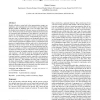Free Online Productivity Tools
i2Speak
i2Symbol
i2OCR
iTex2Img
iWeb2Print
iWeb2Shot
i2Type
iPdf2Split
iPdf2Merge
i2Bopomofo
i2Arabic
i2Style
i2Image
i2PDF
iLatex2Rtf
Sci2ools
216
Voted
POPL
2008
ACM
2008
ACM
Systems biology, models, and concurrency
Models will play a central role in the representation, storage, manipulation, and communication of knowledge in systems biology. Models capable of fulfilling such a role will likely differ from the familiar styles deployed with great success in the physical sciences. Molecular systems at the basis of cellular decision processes are concurrent and combinatorial. Their behavior is as much constrained by relationships of causality between molecular interactions as it is by chemical kinetics. Understanding how such systems give rise to coherent behavior and designing effective interventions to fight disease will require a notion of model that is akin to the concept of program in computer science. I will discuss recent progress in implementing a platform and tools for formal analysis that bring us closer to this vision. Protein interactions are represented by means of rules expressed in a formal language that captures a very simple, yet effective and biologically meaningful level action. M...
Additional Foundational Layer | Cellular Decision Processes | Genetics General Terms | POPL 2008 | Programming Languages |
Related Content
| Added | 03 Dec 2009 |
| Updated | 03 Dec 2009 |
| Type | Conference |
| Year | 2008 |
| Where | POPL |
| Authors | Walter Fontana |
Comments (0)

